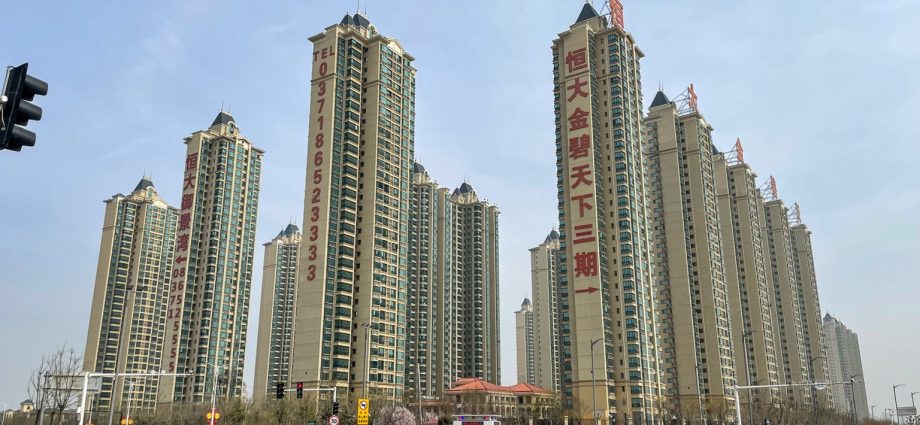The Chinese government is reportedly drafting a white list of around 50 major property developers that will be allowed to borrow from banks more easily to maintain their construction work, a move that has at least temporarily lifted beleaguered property company shares.
The People’s Bank of China (PBoC), the National Administration of Financial Regulation and the Chinese Securities Regulatory Commission met on November 17 and jointly planned to offer new loans to certain property developers in the first quarter of 2024, according to some Chinese media.
Hong Kong-listed property developers’ shares have surged by 20-30% over the past few days on the news. Longfor Group’s shares have gained 22% this week while Country Garden’s shares have skyrocketed 36%. Sunac China is up 29%.
Meanwhile, Bloomberg reported on Thursday that China may allow banks to offer unsecured short-term loans, or so-called working capital loans, for the first time ever to some qualified developers.
Citing unnamed sources, the report said the new financing facility would be available for day-to-day operational purposes, helping property developers to free up capital for debt repayment.
Some property analysts said the new bank loan facility will help large property developers improve their cash flow while leaving smaller developers in the cold. They said the Chinese are still reluctant to purchase homes when prices keep falling.
On November 8, an article with the title “Property prices in Shenzhen are collapsing” was widely circulated online.
It said the average property price at Huajun Garden in Baoan district has dropped 57% to 1.85 million yuan (US$259,843) per unit from a peak of 4.2 million yuan a few years ago. Property prices have fallen 41% to 2.4 million yuan at Youlin Apartment in Nanshan district and decreased 46% to 3.9 million yuan at Longyueju in Longhua district.
Citing more than 15 cases, the article said property prices in Shenzhen have lost 30-50% in recent years, causing property investors and homebuyers to delay purchases.
The article was republished by some media platforms in the following days after its publication but then it was inexplicably removed from the Chinese internet. A few netizens continue to circulate the article.
Online commentators said it is not a surprise that Shenzhen saw a bigger fall in home prices than other Chinese cities as the technology hub’s property markets had grown faster than those in Beijing, Shanghai and Guangdong over the past decade.
‘Financing black hole’
In July 2020, China’s financial regulators launched what they called “three red lines” that barred highly-geared property developers from receiving loans for expansion.
The negative impact of the policy started showing effects in the second half of 2021 as property giant Evergrande Group failed to pay its contractors, deliver homes and repay its wealth management product buyers.
Earlier this year, China’s property prices rebounded slightly after the country lifted all of its Covid-19 rules and regulations. But they fell again in the second quarter as people saw their income decline amid a slower-than-expected, post-Covid economic recovery.
Following in the beleaguered footsteps of Evergrande, Country Garden and Sunac Group also failed to repay their offshore bond investors and were forced to file for bankruptcy protection in the United States.

Some Chinese media outlets speculated that highly indebted property developers, namely Country Garden, Shimao, Sunac and Cifi Group, will be included on the white list but others were skeptical.
“In the end, those with credit risks may not be added to the white list as they have poor reputations, which make it hard for them to sell their properties,” Zhang Zhifeng, a columnist at Guancha.cn, wrote in an article published on Wednesday.
“These companies also have different and complicated outstanding loans. Once they have access to new money, they may use it to repay their old debt, instead of spending it on business operations,” Zhang says. “While their net assets continue to shrink, the new loan policy may create a ‘financing black hole’ for them.”
“Risks in the property markets are growing and have affected some financially healthy private and state-owned property developers,” said Li Yujia, chief researcher at the Guangdong Planning Institute’s residential policy research center.
“Banks are in general risk averse and avoid offering new loans to indebted property developers, or even call loans from them,” he said. “It’s possible that this trend will lead to systemic risks in the banking sector.”
Huang Wentao, chief economist of CITIC Construction Investment, said it’s likely that the financial regulators will treat healthy and problematic property developers with the same new lending policy, as long as the developers’ financing needs are reasonable.
He said he expects the government to announce more supportive measures to boost property market sentiment.
Some commentators said although 50 major property developers will be able to take out new loans, 20,000 smaller developers will still suffer amid the property downcycle.
Declining home sales
In October, property sales declined 14.4% year-on-year to 809 billion yuan while property sales volume plummeted 20.3% to 77.73 million square meters, according to the National Bureau of Statistics.
In the first ten months of this year, property sales dropped 4.9% to 9.72 trillion yuan from the same period last year while property sales volume fell 7.8% to 925 million square meters.
For the same period, property investment in China decreased 9.3% to 9.59 trillion yuan. The figure fell only 9.1% year-on-year in the first nine months of this year.
Yan Yuejin, research director of the think tank center of E-house China, said the weakening property investment showed that many property developers are still suffering from cash shortages and high inventories.
Read: China’s economic recovery faces deflationary risks
Follow Jeff Pao on Twitter at @jeffpao3

